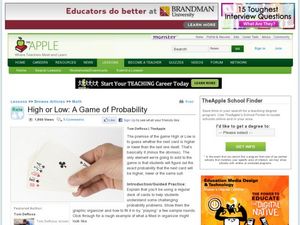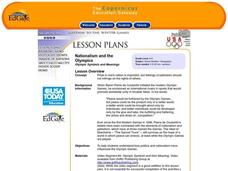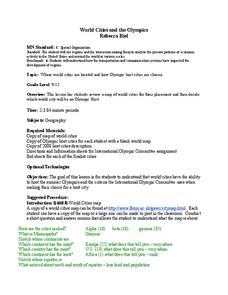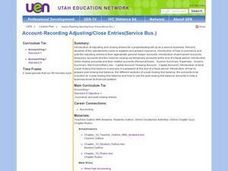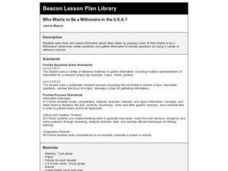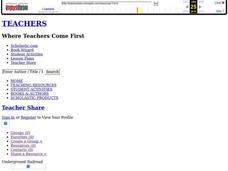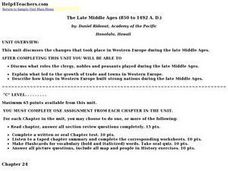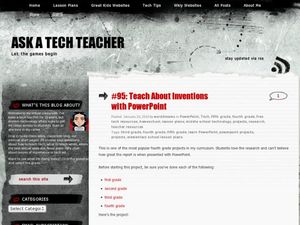Curated OER
High or Low- Probability
Students use playing cards to examine probability. In this probability lesson, students work in groups with a deck of cards and predict if the next card they lay down will be high or low. Students fill out a graphic organizer with their...
Curated OER
International Festival: France
Students explore French culture. In this cross-curriculum social studies lesson plan, students listen to Madeline by Ludwig Bemelmans and identify words and landmarks associated with France. Students pronounce several phrases in French,...
Curated OER
Nationalism and the Olympics
Students discuss the topic of nationalism in the Olympics. After viewing video segments, they discuss how politics and nationalism have influenced the Olympic Games in various ways. They also examine the main reasons why a country...
Curated OER
World Cities and the Olympics
High schoolers examine the various cities in which Olympics have been held. Using a map, they describe the reasons why those cities were chosen and choose their own city for the Olympics and state the reasons why. They examine...
Curated OER
Playing Psychologist
Students, in groups, research one of the following: Bipolar Disorder, Depression, Anxiety Disorder, Obsessive Compulsive Disorder, Posttraumatic Stress Disorder, Dissociative Identity Disorder, Schizophrenia, and any other disorders that...
Curated OER
Account-Recording Adjusting/Close Entries(Service Bus.)
Students participate in a number of activities to learn how to adjust general ledger accounts and journal closing entries.
Curated OER
Claim Your Jurisdiction Game
Students identify levels within the judicial system. They determine which court handles which particular type of case. Finally, they identify the differences between federal and state court jurisdiction.
Curated OER
Claim Your Jurisdiction Game: Getting Ready For Moot Court
Young scholars explore the jurisdictions of the courts in the federal and state systems. Students identify the differences in the two systems.
Curated OER
Getting along With Others
Young scholars examine character traits to find the most positive behaviors. In this getting along lesson, students identify behaviors that are beneficial to getting along. Young scholars evaluate their own behaviors and target three...
Curated OER
Who Wants to Be a Millionaire in the U.S.A.?
Students research the states, gathering information and creating questions and answers. They play a form of Who Wants to be a Millionaire? using the student-generated questions and answers.
Curated OER
Yorktown
Students examine the last major battle of the Revolutionary War at Yorktown. After viewing photographs, they participate in simulations of the surrender by Cornwallis. To end the instructional activity, they put the events of the...
Curated OER
Underground Railroad
Students navigate the Scholastic Underground Railroad site and listen to journey of the Underground railroad. In this Underground Railroad lesson, students use maps and compare and contrast the differences between the North and South...
Curated OER
The Late Middle Ages (850 to 1492 A. D.)
Students discuss what roles the clergy, nobles and peasants played during the late Middle Ages. They explain what led to the growth of trade and towns in Western Europe. Ultimately, students describe how kings in Western Europe built...
Curated OER
Progression of Political Movements
Young scholars examine the various political parties throughout history. In groups, they are given documents identifying the platforms of the parties in the 1868 election. To end the lesson plan, they share their information with the...
Curated OER
Can Girls Be Plumbers? And Other Gender Stereotypes
Students realize the effects of stereotypes by collaboratively creating a chart with the rest of their class. In this equality instructional activity, students demonstrate stereotypes by collaborating on a jobs chart and matching...
Curated OER
Teach Inventions with PowerPoint
Students research famous inventors and what they invented. In this technology lesson, students gather facts about a specific invention and create a PowerPoint slideshow about it. Students practice adding in animation and color to the...
Curated OER
Can Girls Be Plumbers?
Students discover stereotypes in modern society. In this gender role lesson, students create a display of "school workers" and identify jobs as either male or female. The students discuss their choices and overcome these stereotypes.
Curated OER
How Bad Can It Get
Students outline solutions for what would happen if we had an oil shortage. In this oil shortage lesson plan, students research and discuss an oil crisis that can occur and what would happen to society if it did.
Curated OER
The constitution and Our Republic
Students record and interpret data. In this constitution lesson, students discuss voting and making bar graphs. Students practice voting and do a bar graph activity. Students make visual representations of votes on the board.
Curated OER
Who Is the Mature Adult
Young scholars recognize terms and concepts that are key in defining older adult population. They distunguish important demographics that encourage a better understanding of the mature adult population.
Wild BC
Bearly Any Ice
After reviewing food chains, your class members participate in an arctic predator-prey game that exemplifies the impact of climate change of food availability. If you are in a hurry, skip this lesson, but if you have the time to...
Practical Money Skills
Living on Your Own
Every teen dreams of living independently, but often without thinking about the details and costs involved with moving out. Three lessons in a unit about living on your own focus on moving costs, fixed and flexible costs associated with...
Practical Money Skills
Saving and Investing
You have to have money to make money, especially in the world of banking and investments. High schoolers learn about interest rates, saving and investment options, and ways to stay aware of their money's security and earning ability with...
Curated OER
The Structure of British Columbia's Government
Eleventh graders play a "card game" centered around a "Jeopardy" type of task designed to review pertinent information on the subject of the three branches of B.C.'s government.


